



Jammu feels like stepping into a warm embrace where history and everyday life blend effortlessly. The city hums with a gentle energy—morning prayers echo from ancient temples,mingling with the chatter of street vendors setting up their stalls. As you wander through its bustling bazaars,the air is thick with the scent of spices—cardamom,saffron,and cumin—inviting you to taste the rich flavors of local cuisine. You’ll find yourself drawn to the aroma of freshly baked kaladi cheese,a regional specialty that’s both tangy and comforting. What makes Jammu truly special is its unique position as the gateway to the Himalayas,yet it carries a distinct cultural rhythm all its own. The people here are warm and welcoming,their smiles as genuine as the stories they share about their city’s past. You can feel the layers of history in the sandstone walls of the Raghunath Temple complex or in the quiet corners of the Mubarak Mandi Palace,where royal tales linger in the air. Evenings in Jammu are magical—the sun dips behind the Shivalik hills,casting a golden glow over the Tawi River. The city lights flicker on,and the aroma of street food stalls offering momos and chai fills the cool air. It’s a place where tradition and everyday life dance together,inviting you to slow down,savor each moment,and discover a side of India that feels both timeless and alive.
The information on this page is currently being reviewed by Tripkliq and should be used as a guide only
Eng word: Hello
Eng pronunciation: Namaste
Local language: नमस्ते
Eng word: Goodbye
Eng pronunciation: Alvida
Local language: अलविदा
Eng word: Thank you
Eng pronunciation: Dhanyavaad
Local language: धन्यवाद
Eng word: How much
Eng pronunciation: Kinna
Local language: किन्ना
Eng word: Toilet
Eng pronunciation: Shauchalay
Local language: शौचालय
Eng word: Help me
Eng pronunciation: Meri madad karo
Local language: मेरी मदद करो
Eng word: Yes
Eng pronunciation: Haan
Local language: हाँ
Eng word: No
Eng pronunciation: Nahi
Local language: नहीं
Eng word: Excuse me
Eng pronunciation: Maaf karna
Local language: माफ़ करना
Jammu has a rich history dating back to ancient times, with evidence of human settlement found in the region from as early as 3000 BCE.
The city of Jammu was ruled by various Rajput dynasties, including the Dogra dynasty, which had a significant influence on the cultural and political landscape of the region.
Jammu was a part of the Mughal Empire during the reign of Akbar, and was an important center of trade and commerce in the region.
Jammu came under Sikh rule in the early 19th century, when the region was conquered by Maharaja Ranjit Singh of the Sikh Empire.
The Dogra dynasty, founded by Maharaja Gulab Singh in the early 19th century, played a crucial role in shaping the history of Jammu and the surrounding regions.
During the partition of India in 1947, Jammu witnessed widespread violence and displacement, leading to significant changes in the demographic makeup of the city.
Jammu became a part of the Indian Union in 1947 after Maharaja Hari Singh signed the Instrument of Accession, leading to the region's integration into the newly independent India.
Jammu is home to several historic temples, including the Vaishno Devi temple, which is one of the most revered pilgrimage sites in India.
Jammu is known for its cultural diversity, with a blend of Hindu, Sikh, and Muslim communities coexisting in the city for centuries.
In Jammu, the most common Power Adaptor is Type C, Type D.


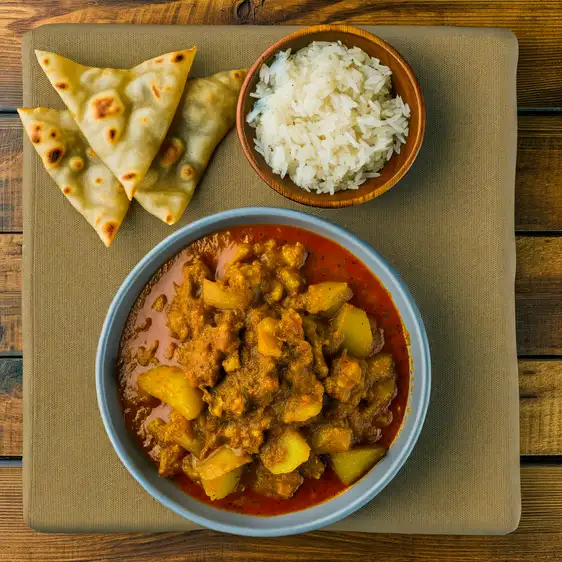
Spicy baby potatoes cooked in a rich and flavorful gravy, often served with rice or bread.
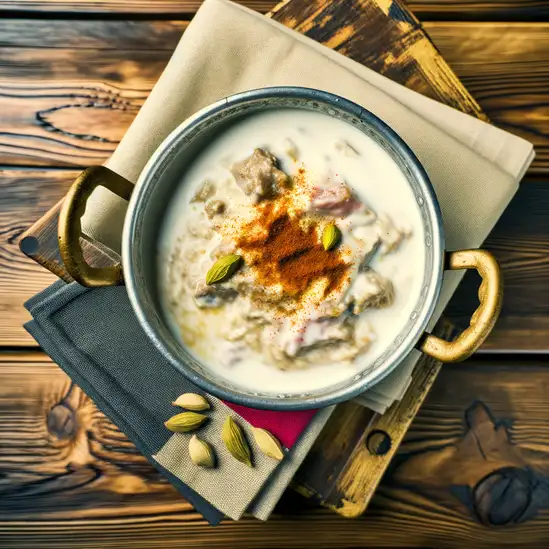
A yogurt-based curry made with meat (usually chicken or mutton) and flavored with aromatic spices, often served with rice.
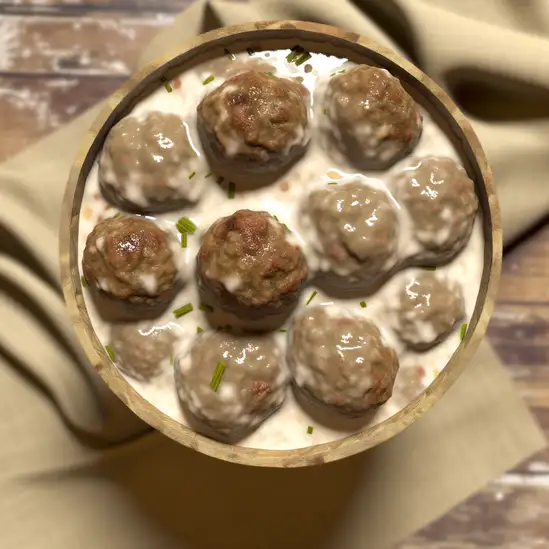
A traditional Kashmiri meatball dish made from minced mutton, cooked in a creamy yogurt-based gravy, often served at special occasions.
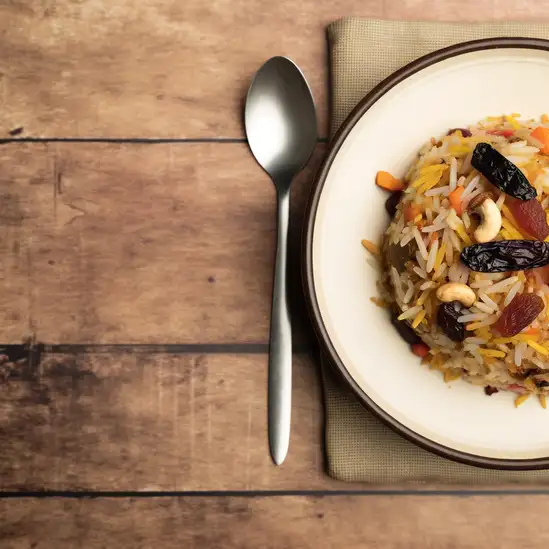
A fragrant rice dish cooked with saffron, nuts, and dried fruits, often served as a side dish or main course.
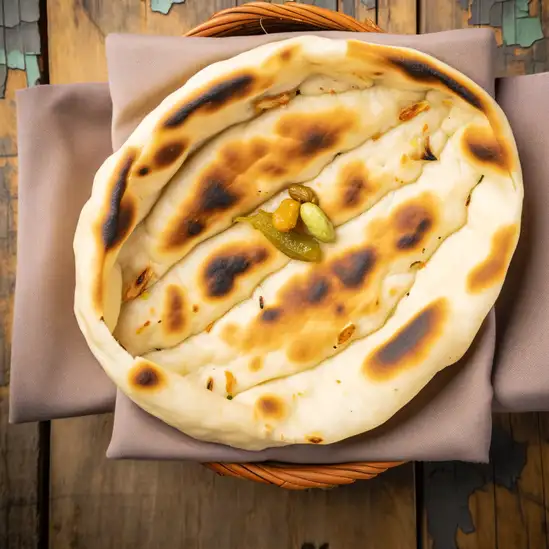
A type of leavened bread stuffed with a mixture of nuts and dried fruits, typically served with various curries.

A staple dish made from red kidney beans cooked in a thick gravy of tomatoes and spices, often served with rice.

Potatoes cooked in a rich and aromatic gravy made with yogurt, spices, and sometimes garnished with dry fruits.

A dish made from paneer (Indian cottage cheese) cooked in a rich gravy of spices and often enjoyed with rice or bread.
If you ever find yourself craving a place where time seems to slow down and nature’s beauty wraps around you like a warm shawl,Srinagar should be at the top of your list. This city,nestled in the heart of Kashmir,feels like stepping into a living painting—where the Dal Lake mirrors the sky and the snow-capped Himalayas stand guard in the distance. The air carries a crisp freshness,tinged with the subtle fragrance of chinar leaves and blooming saffron,inviting you to breathe deeply and just be.
Wandering through Srinagar’s bustling bazaars,you’ll hear the lively chatter of locals bargaining over handwoven pashmina shawls and intricate papier-mâché crafts. The colors here are intoxicating—vibrant rugs draped over shop fronts,the glint of silver jewelry,and the rich hues of Kashmiri spices piled high in market stalls. And then there’s the food:imagine savoring a steaming plate of rogan josh or tasting the delicate sweetness of kahwa tea,its cardamom and cinnamon notes warming you from the inside out.
What truly makes Srinagar unforgettable is its blend of serenity and soul. Whether you’re drifting lazily on a shikara boat across the lake at sunset or exploring ancient Mughal gardens bursting with tulips and fountains,the city invites you to slow down and soak in its gentle rhythms. It’s a place where every corner tells a story,and every moment feels like a quiet celebration of life’s simple,beautiful pleasures.
Leh feels like stepping into a different world—one where the air is crisp and thin,and the mountains stand like ancient guardians all around you. The moment you arrive,there’s this quiet energy,a mix of peaceful solitude and vibrant life. Walking through the narrow streets,you’ll hear the soft chatter of locals,the distant ringing of prayer bells,and the occasional flutter of colorful prayer flags dancing in the breeze. The scent of burning juniper and fresh yak butter tea fills the air,grounding you in the unique culture of this high-altitude town.
The architecture here is unlike anywhere else—mud-brick houses with flat roofs,monasteries perched on hillsides,and the imposing Leh Palace watching over the town like a silent storyteller. The people are warm and welcoming,their smiles genuine,inviting you to slow down and soak in their way of life. You’ll find yourself savoring momos stuffed with spiced meat or vegetables,and sipping salty butter tea that’s surprisingly comforting in the cold mountain air.
What really makes Leh unforgettable is how it blends rugged natural beauty with deep spiritual roots. Whether you’re wandering through the bustling market,exploring ancient gompas,or just sitting quietly watching the sunset paint the Himalayas in shades of gold and pink,there’s a sense of timelessness here. It’s a place that invites you to breathe deeply,listen closely,and feel connected—to the land,the people,and something quietly profound within yourself.
If you want to feel a city’s heartbeat,Amritsar is where you should go. The moment you step into its bustling streets,there’s an unmistakable energy—vibrant,warm,and deeply rooted in tradition. The golden shimmer of the Harmandir Sahib,or Golden Temple,at sunrise is something you won’t forget. It’s not just a sight; it’s an experience. The temple’s reflection dancing on the water,the soft hum of prayers,and the gentle clinking of the karah prasad being served create a peaceful yet powerful atmosphere.
Walking through the narrow lanes,you’re greeted by the aroma of spices,fresh jalebis frying in bubbling oil,and the earthy scent of chai brewing in roadside stalls. The city’s character is a beautiful blend of devotion and everyday life—people chatting animatedly,vendors calling out their wares,and the occasional sound of traditional Punjabi music floating through the air. It’s a place where history and culture aren’t just preserved but lived every day.
Don’t miss the langar at the Golden Temple,where thousands sit together to share a simple,hearty meal. It’s a humbling reminder of community and generosity. And if you’re up for it,the Wagah Border ceremony nearby is a theatrical display of patriotism and pageantry that’s both thrilling and moving. Amritsar isn’t just a city to visit; it’s a place that stays with you long after you leave.
If you’re craving a break from the usual hustle,Shimla feels like stepping into a gentle,cool embrace. Nestled high in the Himalayas,this town carries a timeless charm that’s both soothing and invigorating. Imagine waking up to crisp mountain air,the scent of pine mingling with fresh earth,and the soft murmur of the nearby forest. The streets,lined with colonial-era buildings and cozy cafes,invite you to slow down and savor the moment. There’s a peaceful rhythm here,but also a lively buzz around the Mall Road where locals and travelers mingle over steaming cups of chai.
Walking through Shimla,you’ll notice how the city wears its history with pride—Victorian architecture stands alongside bustling markets selling handwoven woolens and local jams. The chatter of shopkeepers,the clinking of tea glasses,and the occasional distant call of a mountain bird create a soundtrack that feels both familiar and new. Don’t miss wandering up to the Ridge,where panoramic views of snow-capped peaks stretch endlessly,or catching the sunset that paints the sky in soft pinks and oranges.
What really makes Shimla special is its blend of nature and culture. You can hike through deodar forests,explore quaint temples,and then settle into a warm,rustic inn where the aroma of homemade Himachali food—think spiced lentils and fresh bread—wraps around you like a comforting blanket. It’s a place that invites you to breathe deeply,explore gently,and leave with a heart full of quiet joy.
Manali feels like stepping into a storybook nestled high in the Himalayas,where crisp mountain air fills your lungs and the scent of pine mingles with the faint aroma of wood smoke from cozy fires. The town hums with a laid-back energy—travelers and locals alike wandering through bustling bazaars,their voices blending with the distant rush of the Beas River. You’ll find yourself drawn to the vibrant colors of handwoven shawls and the rich spices wafting from street food stalls,tempting you to try steaming momos or a cup of chai that tastes like warmth itself.
What makes Manali truly special is its seamless blend of adventure and tranquility. One morning,you might be hiking through emerald forests,the crunch of leaves underfoot and birdsong all around,and by evening,you’re sipping apple cider in a quaint café,watching the sun dip behind snow-capped peaks. The local culture is a beautiful mix of Himachali traditions and the easygoing spirit of travelers from all over the world,creating a welcoming vibe that feels like a second home.
There’s a magic in the way the town’s ancient temples and bustling markets sit side by side with modern cafés and yoga retreats. Whether you’re exploring the winding streets of Old Manali or simply soaking in the panoramic views from a hilltop,the place invites you to slow down,breathe deeply,and savor every moment. Trust me,Manali isn’t just a destination—it’s a feeling you carry with you long after you leave.
If you ever find yourself craving a city that feels both refreshingly modern and deeply rooted in thoughtful design,Chandigarh is where you should go. Walking through its wide,tree-lined boulevards,you immediately notice a calm orderliness that’s rare in India’s bustling urban scenes. The air carries a subtle mix of fresh earth and blooming flowers from the meticulously maintained gardens,like the famous Rock Garden and the sprawling Rose Garden,where colors burst vibrantly against the clear blue sky. It’s a place where nature and architecture seem to have a quiet conversation.
The city hums with a gentle energy—people chatting over chai at roadside stalls,the distant call of temple bells mingling with the soft rustle of leaves. Food here is a delightful surprise; from spicy street snacks like chaat to hearty Punjabi thalis,every bite feels like a warm invitation to the local culture. Chandigarh’s character is shaped by its unique history as India’s first planned city,designed by the visionary Le Corbusier,which gives it a clean,open feel that’s both inspiring and soothing.
What I love most is how Chandigarh balances the old and the new effortlessly. You can spend your morning exploring contemporary art galleries or quirky cafes,then lose yourself in the peaceful serenity of Sukhna Lake by evening,watching the sun dip below the hills. It’s a city that invites you to slow down,breathe deeply,and appreciate the thoughtful rhythm of life here. Trust me,once you’ve experienced Chandigarh,it stays with you in the best way.
Street vendors sell fake saffron, gemstones, or handicrafts claiming they are authentic local products at inflated prices.
Scammers ask tourists for donations for fake charities or religious causes, exploiting their goodwill.
Individuals offer to help pilgrims with 'special passes' or shortcuts to Vaishno Devi but charge high fees for fake or unnecessary services.
Scammers pose as travel agents offering cheap packages for Vaishno Devi or other attractions, but disappear after taking advance payments.
Scammers claim to offer discounted hotel bookings but provide fake confirmations, leaving tourists stranded upon arrival.
Drivers charge exorbitant rates for short distances or claim fixed rates for tourists, especially for trips to Vaishno Devi or Patnitop.
Unregistered guides offer their services and provide incorrect or misleading information while charging high fees.
The use, possession, and trafficking of narcotic drugs and psychotropic substances are strictly prohibited under the Narcotic Drugs and Psychotropic Substances Act (NDPS) of 1985. Penalties for drug-related offenses are severe and can include long prison sentences and heavy fines. Tourists should avoid any involvement with illegal drugs while in Jammu.
In Jammu, as in the rest of India, smoking is prohibited in public places such as hospitals, educational institutions, public transport, and restaurants. The Cigarettes and Other Tobacco Products Act (COTPA) of 2003 regulates smoking in public places. Violators can be fined. Designated smoking areas may be available in some hotels and larger establishments.
Vaping is subject to strict regulations in India. The Indian government banned the production, import, sale, and advertisement of e-cigarettes and vaping products in 2019. Tourists should avoid bringing vaping devices and e-liquids into Jammu, as possession and use can lead to legal consequences.
What are other people saying about Jammu?
Recent Social posts about Jammu
There is nothing to show you for now.